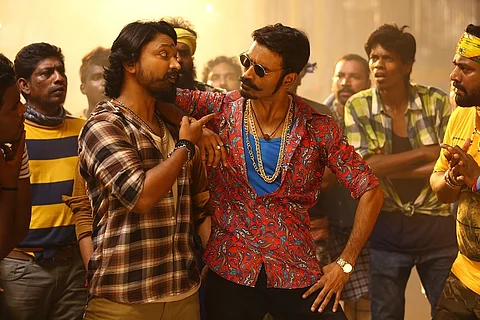

In 2015, when Maari first hit screens, Balaji Mohan brought to life a character encompassing several shades of grey. An actor like Dhanush, typically seen in the hero mould, was refreshing to watch as a thug who took extreme joy in torturing and extorting money from innocents, and scorning any form of attachment. Even the masses in the film hated him with passion. Maari's antics were thoroughly entertaining and it was this detached anti-hero that made a mark in what was otherwise an average movie.
In the sequel, however, the director burdens our once unfeeling protagonist with unending attachments and emotions, giving him no space to actually be himself. Maari 2 picks up after the death of Velu, the gangster whom Maari was associated with in the first film and adds to its coterie - Anandhi (Sai Pallavi), Beeju (Tovino Thomas) Kalai (Krishna Kulasekaran) and Vijaya Chamundeswari (Varalaxmi Sarathkumar). The plot follows along the line of a Vada Chennai or Chekka Chevantha Vaanam, both releases from this year which attempted to capitalise on the gangster genre. Betrayal and revenge remain the two main motivations for the actions of the characters through the two and a half hour run time.
Kalai, a fellow gangster, is introduced as the son of the late Velu and is Maari's best friend. They unitedly decide Kalai will lead their group of thugs who smuggle contraband into the city. And if suddenly dumping the carefree protagonist with a best friend wasn't enough, Maari is even shown as helping him out of severe drug addiction (way out of character). Anyway, one would think that holding you for hours while you shake the drugs off your system is proof enough of being a good friend. But Kalai jumps at the first opportunity to doubt his friend's loyalty and plays right into the hands of our villain - Beeju.
Now you may ask, how I know he is the villain, considering that most people in this movie are thugs. Well first, he gets introduced as Thanatos (Greek god of death), then he has dreadlocks sprouting out of his head as he smokes chillum (hello, Hindu god of death) and if that wasn't enough, he reads a book called Dead Souls. And JUST in case, you are still too dumb to figure it out, he has 'Kill Maari' scratched all across the walls of his prison cell. The real question is, however, why he wants to kill our protagonist and the director answers that with a very unconvincing flashback.
If you think, that is the last time they hit the rewind button, the joke is on you. Most of the screenplay is filled with flashbacks trying to explain the irrational behaviour of characters. Every time the movie goes five steps forward, the screenplay takes you back ten steps to explain itself. While it is a great storytelling device, it has been used excessively. Even Anandhi's love for Maari, for example, is explained through a flashback. Her grating behaviour however, remains unexplained.
Sai Pallavi, who is undoubtedly one of her generation's best actors, is underwhelming in her role as 'Araathu' Anandhi, an auto driver. Her 'Madras baashai' is unconvincing and dampens her efforts to portray a 'mass' female lead in this film. Over the top acting further contributes to the downhill journey. Her character's constant efforts to gain Maari's love and attention do evoke a few laughs but for most part, takes away from what makes Maari..well, Maari. In the dance sequences however, Sai Pallavi shines as she matches and even outdoes Dhanush, especially the 'Rowdy Baby' song. Varalaxmi Sarathkumar meanwhile, plays a strong character but is mostly just a tool to launch the narrative into more flashbacks.
Dhanush, for his part, plays the role he is given with aplomb. He transitions from 'mass' to 'mound of emotion' effortlessly every time the script demands but is let down by a story arc that makes him seem more pitiable than foreboding. He is pitted against Tovino Thomas, who offers about two expressions, neither of which is in the slight bit menacing. And considering the 'God of death' buildup, you would imagine that he was going to come up with a clever plan to finish off the hero. But no such luck. A movie that could have ended with some phone calls for clarification of betrayal (hello, 21st century speaking) and well-aimed bullets stretches into an unexpected second half, that is wildly reminiscent of Baasha.
Credit, however, must be given to cinematographer Om Prakash and the set designers who have brought alive the film with great visuals and colours that change with the mood of the script. The music, while not as good as the first installment, holds its own, adding panache to the movie's many fight scenes. But as this review and month come to an end, if 2018 has taught us anything, it is that not all sequels need to be made.
Disclaimer: This review was not paid for or commissioned by anyone associated with the film. Neither TNM nor any of its reviewers have any sort of business relationship with the film's producers or any other members of its cast and crew.